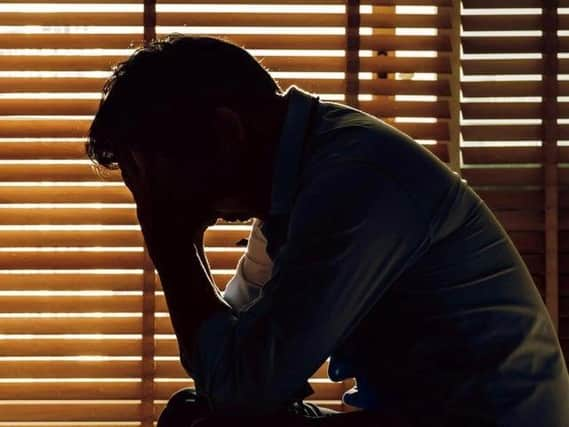Leeds man attacked by wife on wedding day shares story as male domestic abuse increases during lockdown


Despite more being done to tackle the stigma surrounding male domestic abuse, campaigners fear there are many men suffering in silence because they are too reluctant to speak out.
The concern has been voiced as The ManKind Initiative Charity reveals that calls to its helpline since March 30 are 35 per cent higher than before the lockdown began.
Advertisement
Hide AdAdvertisement
Hide AdAnd the organisation, which was the first charity in the UK to support male victims of domestic abuse, warns its helpline is at capacity.
Figures for visitors to its website through April were 76 per cent higher than normal and a sharp acceleration throughout May has seen visitor numbers surging by 250 per cent.
Today the YEP explores the issue in the second of a series of articles in support of the No Excuse for Abuse campaign, backed by Leeds Rhinos Foundation and Inspire North, as part of efforts to educate the public about how to spot and report the signs of domestic abuse.
Mark Brooks, chairman of ManKind, said a lot of the calls coming in were from men experiencing mental health issues not related to violence or abuse who had been unable to get face-to-face help from other organisations. There were also calls from dads being denied pre-agreed access to children, citing mums using coronavirus as an excuse.
Advertisement
Hide AdAdvertisement
Hide AdHe said work around men’s mental health had given some victims the confidence to speak out but the public’s perception of male domestic violence needs to change radically if those experiencing it are to recognise the abuse for what it is and have the confidence to seek help.
“When it comes to reporting, men are 2.5 times less likely to tell anybody,” Mr Brooks said. “There is a lot of under-reporting and under-recording. Agencies such as GPs and A&Es are not viewing what (men) are going through as domestic abuse.
“While the mental health movement encouraging men to speak out has made a difference, I have always said there is no point saying they need to speak more if no-one is listening. It is not just up to men, it is up to services to adapt and be more victim friendly.
“There is an empathy gap about how society recognises male victims and well-being, compared to female victims.”
Advertisement
Hide AdAdvertisement
Hide AdThe project has heard from male victims who have shared their stories in the hope that it encourages other men to come forward and seek help.
‘Sam’, who did not want to give his real name, was attacked by his new wife on their wedding day. It was the culmination of years of incidents.
He said: “She really beat me, kicking and punching me repeatedly. I remember her digging her nails into my cheek, it felt like she was going to rip my cheek off.
“I managed to get away and ran down the road in bare feet and my wedding suit. I went back because she was threatening to hang herself with my wedding tie. I later got beaten because the cuts on my face ruined our honeymoon pictures.”
Advertisement
Hide AdAdvertisement
Hide AdThe abuse had started out as emotional rather than physical. Sam was rarely allowed anywhere by himself other than work and she would phone constantly throughout the day.
He had tried to leave before but his abuser had said she would overdose on tablets and threatened to hurt future girlfriends he might meet.
The first physical attack was unprovoked. She ran into the house, grabbed a knife and attacked him before grabbing his testicles and twisting them, causing excruciating pain.
Other attacks saw Sam being punched in the head, hit with a pint glass and punched in the eye while driving around a roundabout.
Advertisement
Hide AdAdvertisement
Hide AdSam’s wife was eventually convicted of assault by beating and Sam is now seeing a therapist.
The Domestic Abuse Bill 2019-21 is currently working its way through the parliamentary process and had a second reading in the House of Commons on April 28. It is due to go to the committee stage on June 4.
The legislation contains some key points which the Mankind Initiative supports, including statutory definitions being gender neutral to ensure equality for victims and perpetrators, and economic abuse being listed in the definitions.
However, the charity is campaigning for more measures to be considered such as adding parental alienation to the definitions, more alignment with Scotland on coercive and controlling behaviour, improvements in accountability and transparency of the Domestic Abuse Commissioner, and national awareness campaigns.
Advertisement
Hide AdAdvertisement
Hide AdIt also wants to see better access to safe homes for male victims as currently there are only 40 places in the country for men.
Mr Brookes added: “The big thing is, we need organisations such as police and local authorities to fully recognise that men are victims too. It is more the message and to be treated as equal to female victims. Everything else follows that.”
Abuse statistics
576,000 men and 1.2m were victims of partner abuse in 2018/19 equating to a ratio of two female victims to every one male victim.
In 2017/18, 11 per cent of male victims considered taking their life due to partner abuse compared to 7.2 per cent of women.
Advertisement
Hide AdAdvertisement
Hide AdIn 2017/18, nearly half of male victims failed to tell anyone they were a victim of domestic abuse. They are nearly three times less likely to speak up than women.
In 2018/19, 16 men and 80 women were killed at the hands of their current or ex-partner.
There are 37 organisations with 204 spaces for domestic abuse victims, with only 40 of those places being dedicated for men. Many parts of the UK have no or limited places at all – for instance, London has no spaces.